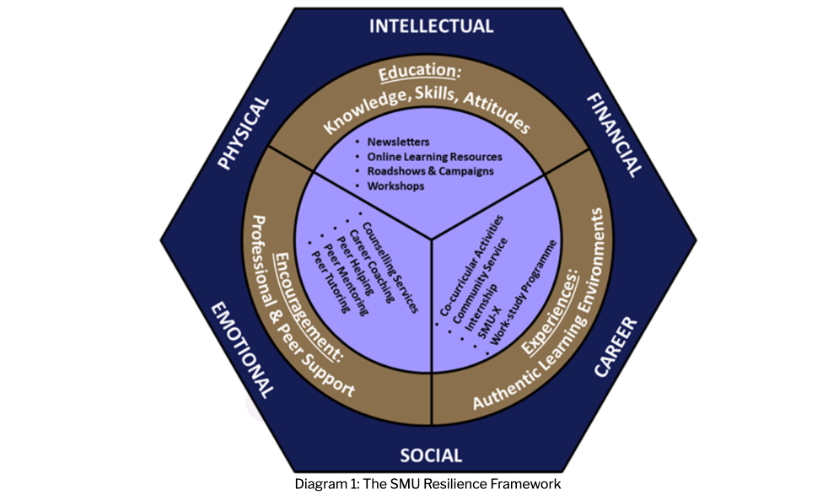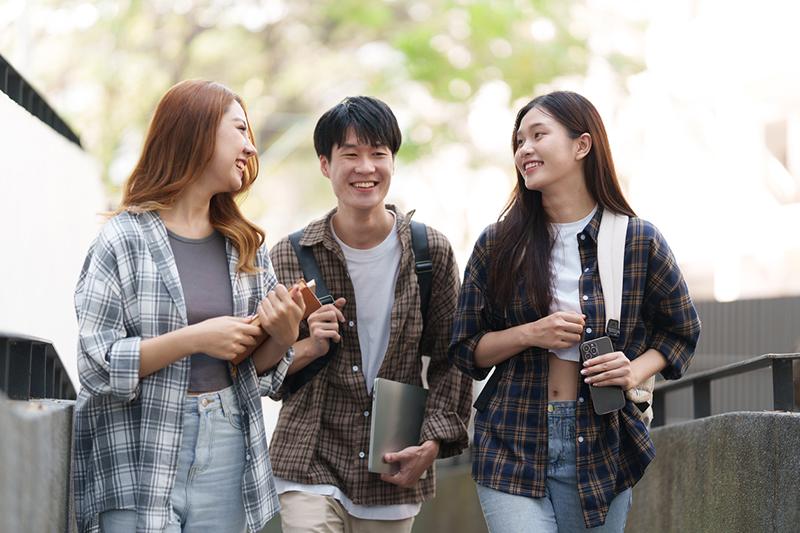Belonging fuels resilience, motivation and personal well-being. It is shaped in classrooms through learning and collaboration, and outside them in leadership roles, community projects, student clubs, internships or simply sharing stories over lunch. When students feel connected to the community of their peers and professors, they are more motivated and better equipped to navigate life’s challenges. They bounce back from setbacks; they’re less likely to fall. And if they do, they know that someone is there to catch them.
Peer support plays a central role in establishing a sense of belonging. It fosters empathy and builds agency. As students support others, they develop the confidence and skills to take care of themselves, too. These everyday acts of care deepen bonds, strengthen community and reinforce a culture where everyone rises together. If one thing defines a fulfilling university experience, it is the deep and lasting human connections formed along the way. These relationships meet our fundamental need to belong, according to research by social psychologist Roy F. Baumeister and psychology professor Mark R. Leary.
A framework born from crisis
When our usually vibrant campus faced the challenges of the Covid-19 pandemic, social isolation and mental health challenges came to the fore. A 2021 Milieu Insight of Singapore poll found three-quarters (76 per cent) of respondents felt depressed, while 65 per cent reported loneliness. This confirmed what we were seeing on the ground. My colleagues and I recognised that resilience cannot be built in isolation. It is rooted in connection.
- Spotlight guide: How to serve the Covid generation
- Video: Developing an explorer mindset to build resilience
- Resilience and empowerment: reframing the narrative for first-gen students
To build community, and underpin a university experience where students are not just surviving but flourishing together, a structured, comprehensive approach is needed. The SMU Resilience Framework, which launched in 2021, integrates support systems – complemented by peers, staff and professors – into a supportive ecosystem.
Adapted from Hettler’s model, our framework fosters growth across the six dimensions of wellness: intellectual, financial, career, social, emotional and physical (see Diagram 1, below). These dimensions are incorporated into our student development initiatives, helping our students build the cultural capital they need to succeed in life.

We adopted a three-pronged approach, as shown in the gold circle, to bring this framework to life:
- Education: we impart knowledge and skills through workshops, roadshows and newsletters to help our students build emotional literacy, critical thinking and empower them to seek help.
- Encouragement: professional and peer support through multiple platforms helps students develop feelings of being listened to, understood and engaged with others.
- Experiences: students’ emotional and psychological horizons are broadened through authentic learning environments. For example, in leading student groups or organising events, students build teamwork, empathy and problem-solving skills.
Targeted programmes and activities connected to the framework’s key dimensions support this three-pronged approach. Physical resilience is promoted through sports, nutrition education and sustainable wellness practices. Intellectual resilience is built not just through academic rigour, but by equipping students with problem-solving skills. Financial resilience is fostered through financial literacy workshops to equip our students with skills to manage resources effectively and share support schemes that ease financial stress. To strengthen social and emotional resilience, students are encouraged to join student clubs and organising committees for university-wide events, deepening connections and cultivating positive social relationships.
Framework in action
Our resilience framework laid the foundation for a suite of integrated student support initiatives, starting with the Student Care and Support Services. Our student care officers engage students directly to address challenges on the ground, from adjusting to university life to balancing academic and personal demands, while helping them build the skills to make informed choices and lead a fulfilling student life.
At the Mrs Wong Kwok Leong Student Wellness Centre, our counsellors provide professional mental health support through individual counselling and psycho-educational workshops. The centre plays a vital role in nurturing student well-being and emotional resilience.
For students who have experienced harassment, discrimination, bullying or sexual misconduct, Voices@SMU offers a safe, confidential space to explore their options and create safety plans. Central to our work are education and outreach efforts aimed at building a campus culture where every student feels safe, respected and empowered to speak up.
Student Accessibility Support assists students with disabilities and special educational needs through needs assessments, tailored accommodations and assistive technology to ensure equal participation in academic and campus life. The Glade Room offers a quiet, restful space for students to decompress and recharge during difficult periods.
To strengthen peer support, we launched the SMU Peer Well-Being Network in 2025. This network includes trained student leaders from SMU Peer Helpers, Voices@SMU advocates, the Student Council of Discipline, and SMU Purple. Together, they champion a culture of care, encouraging students to support one another and seek help when needed.
These efforts reflect a core belief: effective student support should be community-owned and systems-enabled. Pair professional services with structured peer-led initiatives. Create systems grounded in clear frameworks, supported by trained staff and students alike. Empower your community not just to receive support but to provide it, too. That is how we build resilience that lasts.
An interaction at all levels
From a sociological perspective, resilience development, a supportive institutional culture and belonging share a fascinating connection. They create what I would call a positive reinforcement cycle. We share the framework widely and invite students to let us know their own interpretation. This approach then becomes a Singapore Management University-specific student life experience. The result, I hope, is graduates who will carry these qualities far beyond our campus.
At SMU, we believe resilience isn’t innate – it is a skill that can be learned. Today’s students may not realise that the resilience framework was a response to a crisis. Nevertheless, as they go about freely running their own activities – organising events, forming student interest groups, developing leadership initiatives and engaging in community service – students have mentioned that they appreciate having the framework as something to fall back on.
Paulin Straughan is the dean of students at Singapore Management University.
If you would like advice and insight from academics and university staff delivered direct to your inbox each week, sign up for the Campus newsletter.




comment